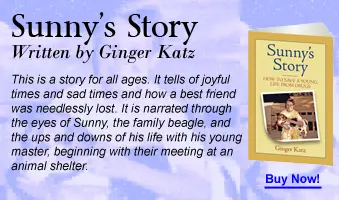Mother whose son died from drug overdose shares heart-rending story: Her book relates boy’s tale through eyes of the family dog
By Andrea Bulfinch
abulfinch@fosters.com
Tuesday, April 9, 2013

Ginger Katz talks to seventh- and eighth-grade Dover Middle School students on Monday about the death of her 16-year-old son, Ian, from a drug overdose. She shares his story in a book titled “Sunny’s Story,” which tells Ian’s story as seen through the eyes of the family dog.
DOVER — If one student can be saved from a fatal drug overdose, the work and time put into sharing her son’s story will have been worth it for Ginger Katz, author of “Sunny’s Story.”
The book tells the tale of her son Ian’s death due to a drug overdose through the eyes of the family beagle. Dover Middle School students have each read the book and on Monday, heard from Katz herself as she spoke during two assemblies at the school with her husband Larry Katz, Ian’s stepfather.
The event was sponsored by the Dover Coalition for Youth who reached out to the middle school to host the author.
For the last 15 years, Katz has made it her mission to prevent them from the same fate that struck her son at age 16.The most important part of the program is for youths to have at least a few adults in their lives they can trust.
“And not to keep any pain inside,” Katz said.
She said she had noticed her son becoming very angry and that he was unable to get his feelings out to share with anyone else.
Parents, she said, can play a big role in diminishing drug use in their children’s lives.
“It’s really important for parents to listen even when they don’t ask questions,” Katz said.
She said parents should tune into their children talking, even if it’s just to hear what they have to say, to know what they’re going through and what sort of drugs they might be exposed to.
“When they can get their pain out, it’s much healthier,” she said.
As for peers of someone using, it’s important to speak up, she noted.
Though it can sometimes be difficult, doing so can make the difference between someone kicking an addiction successfully, or not making it through one.
“If you see a friend in trouble, tell someone,” she said.
A friend of her son’s who knew Ian had been using drugs didn’t tell Katz until more than two years after his death.
“There’s a code of silence among students not to tell,” she said. “I ask kids to have the courage to speak if you see someone in trouble.”
The power of addiction is something she said really hits home with students as far as how real it is.
Vicki Hebert, coalition coordinator, said that if parents set a clear rule or standard for children, they are less likely to try drugs.
Larry Katz said if children are talked to on a regular basis there is only a 5 percent chance of them experimenting with drugs. That number increases to 45 percent for children whose parents don’t engage them regularly in conversation about drug dangers.
He said the biggest issue is that parents don’t really know how to address the subject, but parents are the number one deterrent against drug use.
Katz also is the CEO and Founder of The Courage to Speak Foundation, which offers parents tips on how to speak to their children.
Locally, the DCY offers the Police and Community Together (PACT) program that parents can take advantage of.
The best thing a child can do to prevent drug use is to find a passion, learn refusal skills and have those trusted adults around them ready to identify signs of trouble and whom they can open up to.

Courtesy photo Ginger Katz with three students from the
fifth-grade class, who approached her after her first her
presentation to fifth- and sixth-graders at Dover Middle
School on Monday. From left are Audrey Eisenmann,
Emily Houde, Katz and Makaya Gadwah.






